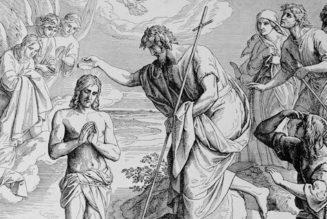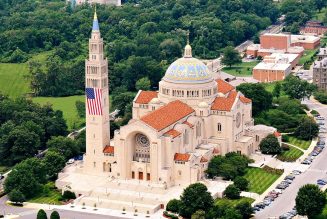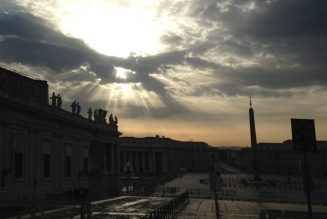By Fr. Jerry Pokorsky ( bio – articles – email ) | Oct 17, 2022
God created us in His image and likeness, and after the Fall, the Cross, and the Resurrection, we overcome evil with God’s grace by following the precepts of the law written on our hearts. Scholars and theologians reasonably consider our natural inclinations and codify them into a natural-law system. But natural law collapses without the light of God’s Revelation.
God gave the Ten Commandments to the Israelites through Moses, and those Commandments are compatible with our natural inclinations. (Every child knows it’s wrong to disobey Mom even before memorizing the Commandments.) We become what we choose. As individuals, when we choose the good, we become godly and respectful of our parents, life, sexuality, property, and the truth. Alternatively, choosing evil deforms us. We become murderers, adulterers, thieves, liars, and so on. Acts of repentance allow us to restore virtuous living.
Natural law is strikingly reasonable and applicable to individuals and society. “Natural law is the foundation upon which the spirit of the Constitution is built. Many of the ideas and terms of art used in the [U.S.] Constitution cannot truly be understood without a deep understanding of the natural law philosophy the Founders held.” Jacques Maritain played a central role in the writing the United Nations’ Universal Declaration of Human Rights with its natural-law foundation.
Natural law dovetails with God’s Revelation. We overcome deformations caused by Original Sin and our personal sins by God’s grace, especially the sanctifying grace of the Sacraments, aided by our practice of virtue. Purgatory completes the natural-law process of spiritual formation. The Church gleans her understanding of purgatory from Tradition and the Scriptures. In the Book of Maccabees, Judas prayed for the forgiveness of the slain in battle: “He made atonement for the dead, that they might be delivered from their sin.” (2 Maccabees 12:38-46) In the Gospel, Jesus speaks about forgiveness in the life to come (cf. Mt. 12:32). When a person dies in the state of grace, “the fires of purgatory” purify a soul of imperfections.
Purgatory is a spiritual “finishing school.” In Boswell’s famous “Life of Samuel Johnson,” Johnson observes: “Why, Sir, it [purgatory] is a very harmless doctrine. They are of the opinion that the generality of mankind are neither so obstinately wicked as to deserve everlasting punishment, nor so good as to merit being admitted into the society of blessed spirits; and therefore that God is graciously pleased to allow a middle state, where they may be purified by certain degrees of suffering. You see, Sir, there is nothing unreasonable in this.”
Like the precepts of natural law, the revelation of purgatory completing the progression of human virtue before entering into the perfection of eternal glory is reasonable. However, the appealing—almost linear—reasonableness of purgatory may call into question the logical need for hell.
In many respects, the eternity of hell does not fit well into our understanding of natural law. We might reasonably expect the fires of purgatory to purify even the greatest of sinners who fail to live according to the precepts of natural law. But hell is definitive and abruptly terminates the human development that purgatory promises. Absent God’s perspective and revelation, purgatory can appear to make more sense than hell “where their worm does not die, and the fire is not quenched.” (Mk. 9:48)
Some theologians—perhaps wincing at the prospect of hell for a single transgression—codify the “fundamental option” as an adjunct to natural law and God’s Revelation. We must consider our basic life in its overall orientation for overall good or evil, they argue. Individual acts of grave immorality do not cancel sanctifying grace. But a general evil direction and state of being may. The view opens the door to measuring good and evil by consequences rather than the intrinsic purpose of every act. The “fundamental option” hypothesis undermines the Church’s traditional teaching on the loss and restoration of sanctifying grace.
The “fundamental option” theory not only distorts the gravity of the evil of individual sins (adultery, fornication, homosexual behavior, and contraception, for example), but the teaching also impairs our understanding of conversion. On this understanding, just as we cannot lose God’s grace except by a pattern of actions determining our fundamental option, we cannot gain God’s grace without a countervailing orientation. Under this theory, our recognition of specific mortal sins and repentance (with perfect contrition and the Sacrament of Penance) is insufficient to attain the infusion of sanctifying grace. The theory renders the Sacrament of Penance meaningless or reduces it to mere therapy.
Natural law detached from the moorings of faith makes it an easy target of abuse. Adrift from God’s law, senior prelates analyze our natural inclinations using modern “sociological” and “anthropological” studies. This approach risks a faithless “paradigm shift“ redefining natural law according to cultural expectations. But God’s wrath (especially in the Old Testament and the Apocalypse) and the doctrine of hell provide the corrective. The threat of damnation confirms the horror of sins such as infidelity, false worship, sodomy, and so-called transgenderism and keeps natural law in tune with Revelation.
God helps us understand the destructive power of sin. Using human reason unaided by revelation, it may be difficult to see the horror and eternal consequences of placing a pagan idol on an altar of sacrifice. God’s wrath in the Old Testament settles the matter. His mysterious violence in punishing false worship reveals that the effects of sin are beyond the reach of human reason and awareness. When we neglect God’s revelation, we decouple human observation and logic from the light of faith, and we condone many errors. God’s revelation—including Jesus’ extraordinary revelation of the eternity of hell—prevents unreasonable and dangerous departures from the natural-law tradition.
God’s ways include punishment that exceeds self-inflicted sufferings incurred by violating the natural order. With every unrepented mortal sin—regardless of our knowledge of consequences—we choose hell. The revealed Word of God, fortified by authentic Church teaching, necessarily elevates, clarifies, and sustains our understanding of natural law.
Sound Off! CatholicCulture.org supporters weigh in.
All comments are moderated. To lighten our editing burden, only current donors are allowed to Sound Off. If you are a current donor, log in to see the comment form; otherwise please support our work, and Sound Off!

There are no comments yet for this item.
Join Our Telegram Group : Salvation & Prosperity









